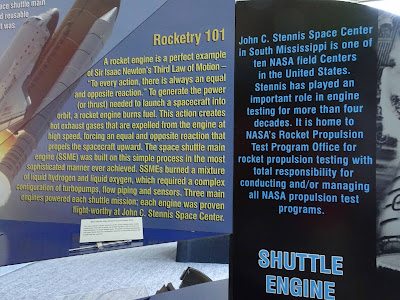State line.
We arrived at our RV site a little after noon and decided
to go on to the Infinity Science Museum and have lunch there.
Entrance.
When we paid our entry fee ($15 for seniors), we were
told it included a free bus tour of a nearby NASA facility. We signed up for the tour then headed to the cafe for, surprisingly, a very good lunch.
Thirty minutes before the bus was to depart, we had to
present ourselves with our driver’s license to the front desk. Soon it was time to board the bus. Although the Science Center was full of
school kids, there were only 6 other passengers taking the NASA tour.
Comfortable, air conditioned bus.
It is a short ride to the Stennis Space Center.
Entry gate.
We passed through the restricted gates of the 14,000-acre
research facility.
Built in the 1960′s to test the history-making Saturn V rocket engines that carried men to the moon, the Stennis complex now has many federal, state and educational agencies, as well as private high-tech companies and corporations like Rolls Royce.
NOAA
It’s also home to the largest concentration of
oceanographers in the world, most of whom are working at
the U.S. Navy's Meteorology and Oceanography Command based here.
Navel Oceanography Command.
There is a 125,000-acre buffer zone (used to block sound) surrounding the Saturn V rocket test stand. When testing, the rocket motor was unbelievably loud, being heard and felt for miles in every direction. When the space center was built, 660 families were relocated to outside of the buffer zone.
Testing pad for Saturn V rocket.
A3 (left), A1 (right), A2 (center)
We headed to 3 other testing pads. The closest pad (A2) is used to test the new SLS
that will be going to Mars. The buffer
zone for this pad is only 300 yards!
This is a short 40-minute tour but very enjoyable. Soon we were back at the Science Center. All the school kids were gone, and we almost
had the place to ourselves.
There are a lot of things to do here!
Simulators and artifacts, video theaters,
Smithsonian-loaned artifacts, and a life-sized, walk-through mock-up of the
International Space Station's Destiny module.
International Space Station
Space suit technology, new space rockets, pre-Apollo
history and a progression of NASA programs from Apollo and Gemini to
International Space Station and the new SLS program, designed to take the first
humans to Mars.
We don’t exactly fit in a space suit.
Space food looks pretty disgusting.
Grits with butter.
Spaghetti with meat sauce.
Cauliflower with cheese.
The Apollo II Virtual Reality Simulator was fun!! It’s very loud and the seats move and pitch
and throw you all over the place. We had
to wear seat belts! There is an extra
charge ($6) but worth it. I’m glad no
one else was around. I think we were
yelling at each other to be heard over the roar in our ear-pieces.
The Spectrum was very
interesting!
X-ray
Ultraviolet
Visible
We can only see light within a certain range of wavelengths and frequency. This range is called the visible spectrum.
Infrared
Microwave.
The electromagnetic spectrum includes a wide range of light waves, some that we can't see. Some of the non-visible types of waves are radio waves, microwaves, infrared rays and x-rays.
Mark was making waves on this Volksmeter II (used to
measure low-frequency seismic activity).
More stuff to play with.
Next time: The most powerful single-chamber liquid-fueled rocket engine ever developed.





























Teri - you wrote about all that technical stuff so well! I have to read notes, do research and still have Randy proof the techno stuff!
ReplyDeleteMark proofreads my writing. If it’s something I don’t understand, like the International Petroleum Museum, he writes the blog. He has a great memory too so I can always ask him questions about what we just saw.
DeleteOh how I love space stuff. This tour is going on the must see wish list. You two looked ready for an EVA in those space suits.
ReplyDeleteIt was fun! A lot more fun after all the school groups left.
Delete